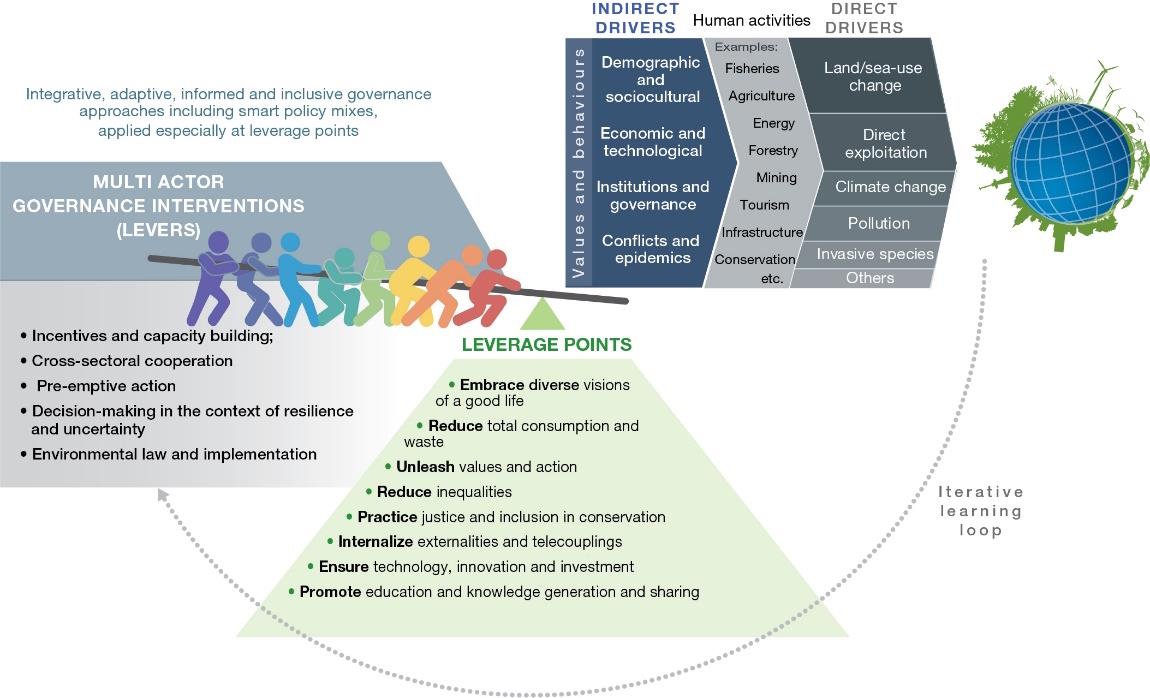Biodiversity loss: Nature’s dangerous decline unprecedented
Vegan Society of Canada News
June 12th 2019
A new report by the Intergovernmental Science-Policy Platform on Biodiversity and Ecosystem Services (IPBES) was recently published and we spent some time going through it. In many ways it reaches similar conclusions to our previous IPCC coverage and this should serve to highlights the interconnectedness of all life on earth. If we address the causes of climate change, we will also address the causes of nature loss, and vice-versa.
Nevertheless, the report addresses nature loss specifically so it uses different wording, and also includes areas that are not necessarily contained in climate change reports, so it is worth exploring further. The report acknowledges the big picture - that nature is essential to human life and that species are going extinct at an alarming rate, much higher than ever before.
Nature and its vital contributions to people, which together embody biodiversity and ecosystem functions and services, are deteriorating worldwide.
Nature is essential for human existence and good quality of life. Most of nature’s contributions to people are not fully replaceable, and some are irreplaceable
Human actions threaten more species with global extinction now than ever before.
Globally, local varieties and breeds of domesticated plants and animals are disappearing. This loss of diversity, including genetic diversity, poses a serious risk to global food security by undermining the resilience of many agricultural systems to threats such as pests, pathogens and climate change.
As human beings we often focus on ourselves and wonder "What are the benefits of biodiversity for us?". Let’s look at a sliver of biodiversity on earth: the rain forest. The rain forest is responsible for about 20% of the world's oxygen and contains about 66% of all plant species in the world. Biologists estimate that tropical rain forests contain about 50% of the world’s terrestrial plant and animal species on only 6% of the planet's surface area. In addition, 70% of the plants identified as having anti-carcinogenic properties by the US National Cancer Institute are found only in the tropical rain forests, and it is estimated that we have only explored 1% of all plants with medicinal properties.
This is just the direct benefits to human beings of ONE ecosystem on earth. It should be clear that nature is essential for human existence and a good quality of life. This is why last year we instituted a moratorium on vegan certification of products containing palm oil. We will discuss this further in a later article.
As everyone knows by now, things have been getting worse both for climate change and nature. By definition a vegan lifestyle must be a sustainable one, otherwise we are exploiting other species by taking an unfair share of resources that all living beings need to survive - let alone thrive - on earth. Once again animal agriculture, over-consumption and a flawed system which favors economic expansion (as measured by GDP) over everything else, are primary factors that account for the state of the planet today.
For terrestrial and freshwater ecosystems, land-use change has had the largest relative negative impact on nature since 1970, followed by the direct exploitation, in particular overexploitation, of animals, plants and other organisms mainly via harvesting, logging, hunting and fishing. In marine ecosystems, direct exploitation of organisms (mainly fishing) has had the largest relative impact, followed by land/sea-use change.
Economic incentives generally have favoured expanding economic activity, and often environmental harm, over conservation or restoration. Incorporating the consideration of the multiple values of ecosystem functions and of nature’s contribution to people into economic incentives has, in the economy, been shown to permit better ecological, economic and social Outcomes.
A key constituent of sustainable pathways is the evolution of global financial and economic systems to build a global sustainable economy, steering away from the current limited paradigm of economic growth. That implies incorporating the reduction of inequalities into development pathways, reducing overconsumption and waste and addressing environmental impacts such as externalities of economic activities, from the local to the global scales. Such an evolution could be enabled through a mix of policies and tools (such as incentive programmes, certification and performance standards) and more internationally consistent taxation, supported by multilateral agreements and enhanced environmental monitoring and evaluation. It would also entail a shift beyond standard economic indicators such as gross domestic product to include those able to capture more holistic, long-term views of economics and quality of life.
The vegan philosophy is against the exploitation of animals let alone their overexploitation. Since we are making ethical arguments about a lifestyle which treats species respectfully, aims at reducing environmental damage, and developing animal-free alternatives for the benefit of all animals and the environment, this lifestyle must at the very least be sustainable. Any other way of living, while possible in the short-term would not work in the long term. A vegan lifestyle must be sustainable. If everyone on the planet was to adopt a sustainable diet we would certainly be in a better position. But for most of us living in developed countries, we would still not be living sustainably since diet is only a part of our way of living. Currently most developed countries consume many times what the earth can provide. In North America the focus is on consumption. While individual actions such as buying 100 items of vegan clothing per month or traveling excessively may not seem to go against the vegan philosophy, when viewed as a whole these actions together are clearly exploiting animals by taking an unreasonable share of the resources required by all species to live.
The report also makes it clear that the remedy to all of this is not small tweaks here and there, but significant change to our society:
Goals for conserving and sustainably using nature and achieving sustainability cannot be met by current trajectories, and goals for 2030 and beyond may only be achieved through transformative changes across economic, social, political and technological factors
Just like with climate change, to preserve nature so it can continue to be the bedrock of life on earth, we need some transformative change and not mere words or token gestures. The report reminds us that transformative change however will face opposition from those with vested interest in the status quo. As seen in the image above, the report emphasizes that we will need to embrace a different version of a good life, one that is not associated with increasing material consumption like it is today in many countries. In addition, we will also need to change what we eat:
Options that address and engage other actors in food systems (including the public sector, civil society and consumers, grassroot movements) include participatory on-farm research, promotion of low-impact and healthy diets and localization of food systems. Such options could help reduce food waste, overconsumption, and demand for animal products from unsustainable production, which could have synergistic benefits for human health
A change of lifestyle offers individuals a powerful means to combat a range of issues, including personal health problems, climate change, loss of biodiversity, global acidification, eutrophication, freshwater shortages, pandemic prevention, antibiotic resistance, save countless lives and much more. We know of no other efficient way for individuals to address these critical challenges simultaneously without waiting for government, corporate, or technological interventions. By changing lifestyle, people can take immediate and impactful action. We encourage you to embrace this lifestyle change today. Contact us for support and to connect with local communities in your area.





